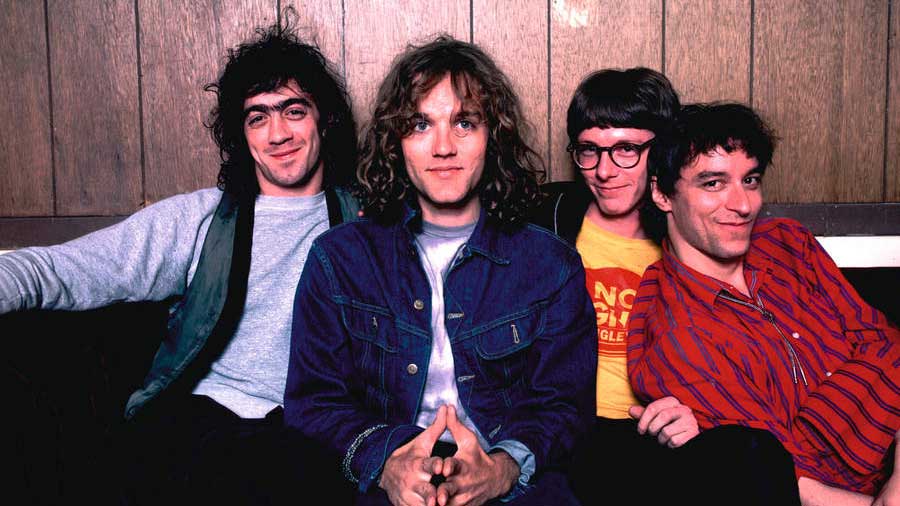R.E.M.'s Reckoning: raw, mysterious and strangely melodic, refracting their influences through a murky Southern prism
How the melodic sophistication of R.E.M.'s second album Reckoning served as a pre-echo of their 90s success

Select the newsletters you’d like to receive. Then, add your email to sign up.
You are now subscribed
Your newsletter sign-up was successful
Want to add more newsletters?

Every Friday
Louder
Louder’s weekly newsletter is jam-packed with the team’s personal highlights from the last seven days, including features, breaking news, reviews and tons of juicy exclusives from the world of alternative music.

Every Friday
Classic Rock
The Classic Rock newsletter is an essential read for the discerning rock fan. Every week we bring you the news, reviews and the very best features and interviews from our extensive archive. Written by rock fans for rock fans.

Every Friday
Metal Hammer
For the last four decades Metal Hammer has been the world’s greatest metal magazine. Created by metalheads for metalheads, ‘Hammer takes you behind the scenes, closer to the action, and nearer to the bands that you love the most.

Every Friday
Prog
The Prog newsletter brings you the very best of Prog Magazine and our website, every Friday. We'll deliver you the very latest news from the Prog universe, informative features and archive material from Prog’s impressive vault.
R.E.M. were the band to watch come the turn of 1984. Issued the previous April, debut LP Murmur had put the Athens, Georgia quartet at the forefront of a new strain of alternative American guitar-rock: raw, mysterious and strangely melodic. On one level, R.E.M. were leftfield classicists, drawing from The Velvet Underground, Patti Smith and 70s post-punk. But they were also markedly different, refracting their influences through a murky Southern prism that involved disjointed narratives and, in the case of enigmatic singer Michael Stipe, inscrutable lyrics.
Despite selling less than 200,000 copies, Murmur made R.E.M. darlings of US college radio. Critics tended to adore the band too, with Rolling Stone declaring them winners of both Best Album and Best New Artist in their end-of-’83 polls. Their profile was further spiked by debut shows in London that November and their first national TV spot, Late Night With David Letterman.
Refusing to let the grass grow under their feet, R.E.M. were already recording a follow-up album by the time the plaudits rolled in. Reckoning was nailed fast, taking little over a fortnight. The production team of Mitch Easter and Don Dixon, retained from Murmur, sought to bottle the wiry energy of the band’s live shows, putting greater emphasis on REM’s rockier side. Songs weren’t a problem. New compositions were pouring out at a prodigious rate. Guitarist Peter Buck later claimed that Reckoning was recorded quickly to avoid any bothersome interference from their I.R.S. label.
The Letterman appearance had seen R.E.M. preview their most commercial idea to date – an unnamed mid-tempo tune that took form in the studio as So. Central Rain. Its lyrics alluded to Stipe’s late friend, photographer Carol Levy, who died in a car crash. Alongside a more overt Levy tribute, the moving, slo-mo Camera (‘Will she be remembered,’ sings the mournful Stipe), these two songs represent the more elegiac side of Reckoning.
At other times, R.E.M. seem positively joyous. Second Guessing fizzes, powered by Buck’s trusty Rickenbacker and drummer Bill Berry’s delirious thump. Stipe seems to take aim at cultural faddishness, while also offering a simple declaration of arrival in the chorus: ‘Here we are, here we are.’ Pretty Persuasion had been in R.E.M.’s setlist since 1981 and had initially been cut during the Murmur sessions. In its revised form it positively leaps from the speakers – quintessential R.E.M. with bassist Mike Mills driving the harmonies.
Mills is the instigator of another mothballed early song, (Don’t Go Back To) Rockville. It shakes off the punky thrash of its origins in favour of a more measured groove on Reckoning, its melodic sophistication serving as a pre-echo of the band’s 90s success. For now though, R.E.M. were still very much a cult concern.
Sign up below to get the latest from Classic Rock, plus exclusive special offers, direct to your inbox!
Freelance writer for Classic Rock since 2008, and sister title Prog since its inception in 2009. Regular contributor to Uncut magazine for over 20 years. Other clients include Word magazine, Record Collector, The Guardian, Sunday Times, The Telegraph and When Saturday Comes. Alongside Marc Riley, co-presenter of long-running A-Z Of David Bowie podcast. Also appears twice a week on Riley’s BBC6 radio show, rifling through old copies of the NME and Melody Maker in the Parallel Universe slot. Designed Aston Villa’s kit during a previous life as a sportswear designer. Geezer Butler told him he loved the all-black away strip.


